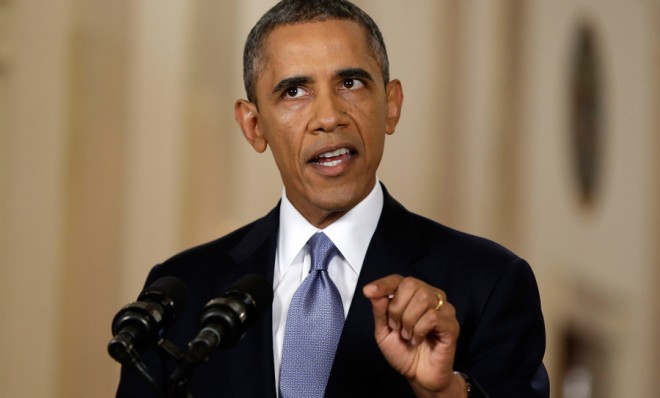Is Congress off the hook on Syria?
Obama tells lawmakers not to vote on Syria strikes just yet


A free daily email with the biggest news stories of the day – and the best features from TheWeek.com
You are now subscribed
Your newsletter sign-up was successful
President Obama said Tuesday night that he had asked Congress to delay a vote on authorizing military strikes against Syria, requesting time to pursue a Russian plan to take control of Syrian President Bashar al-Assad's chemical weapons.
The reprieve came as a relief to Republican and Democratic leaders in Congress, who had urged their caucuses to support Obama but ran into stiff opposition. Senate Majority Leader Harry Reid had originally scheduled a vote on the matter for Wednesday, but postponed it as the diplomatic initiative surfaced, unsure he could muster enough support to pass it.
Does the unexpected diplomatic effort to resolve the crisis really let Congress off the hook, though? It remains unclear whether diplomats at the United Nations will be able to agree on a resolution spelling out how the international community will take control of Assad's arsenal, and later destroy it. There is even greater doubt over whether Assad can be trusted to honor any commitment to surrender his stockpiles of sarin nerve agent, mustard gas, and other poisons.
The Week
Escape your echo chamber. Get the facts behind the news, plus analysis from multiple perspectives.

Sign up for The Week's Free Newsletters
From our morning news briefing to a weekly Good News Newsletter, get the best of The Week delivered directly to your inbox.
From our morning news briefing to a weekly Good News Newsletter, get the best of The Week delivered directly to your inbox.
George Perkovich and Ariel Levite argue at Politico that Obama needs Congress behind him more than ever to capitalize on this unexpected opportunity to eliminate Assad's weapons of mass destruction. They write:
To facilitate this important gain, Congress should adopt a resolution authorizing U.S. military operations if Syria did not agree within a fixed number of days or used chemical weapons again. Such a resolution would enhance the leverage of Russia and other international actors in dealing with Assad. It need not commit the United States to strike if Syria does not agree, but would give the president the option to do so. [Politico]
Obama might not want to get his hopes up, though. As Dylan Scott points out at Talking Points Memo, "Congress was never keen about voting on war, torn between public opposition to the president's proposed strikes and their ideological or political allegiances." Given a chance to shove Syria to the back-burner, he says, congressional leaders will gladly take it.
According to TPM’s whip count, 44 senators and 152 representatives never took a public position. A handful completely flipped their position in the last week, underlining their uncertainty.But with Obama pursuing diplomacy again and asking for a vote delay, the onus is off Congress. Reading between the lines, there seemed to be a collective sigh of relief from Capitol Hill. [Talking Points Memo]
If lawmakers expect the Syria issue to go away, though, they are dreaming. If anything, says Aaron Magid at The Daily Beast, the extra time this diplomatic initiative gives members of Congress only increases the pressure on them to get the decision right.
Perhaps the most important reason for Obama's decision to consult Congress is to slow down the march among many in Washington towards another Middle East war. The time it takes to complete a congressional vote can be used by Russian President Vladimir Putin to orchestrate a diplomatic solution. The delay also forces Congress to ponder the following questions: What should America’s reaction be if Assad uses chemical weapons again? Will an American strike make it more or less likely for Assad to attack regional allies like Turkey or Israel? What is the American plan for the day following the attack? [The Daily Beast]
In other words, now that Obama has done exactly what lawmakers have asked, and halted the rush into a conflict a majority of Americans want no part of, Congress will be on the hook for coming up with a solution if the Russian plan falls apart.
A free daily email with the biggest news stories of the day – and the best features from TheWeek.com
Harold Maass is a contributing editor at The Week. He has been writing for The Week since the 2001 debut of the U.S. print edition and served as editor of TheWeek.com when it launched in 2008. Harold started his career as a newspaper reporter in South Florida and Haiti. He has previously worked for a variety of news outlets, including The Miami Herald, ABC News and Fox News, and for several years wrote a daily roundup of financial news for The Week and Yahoo Finance.
